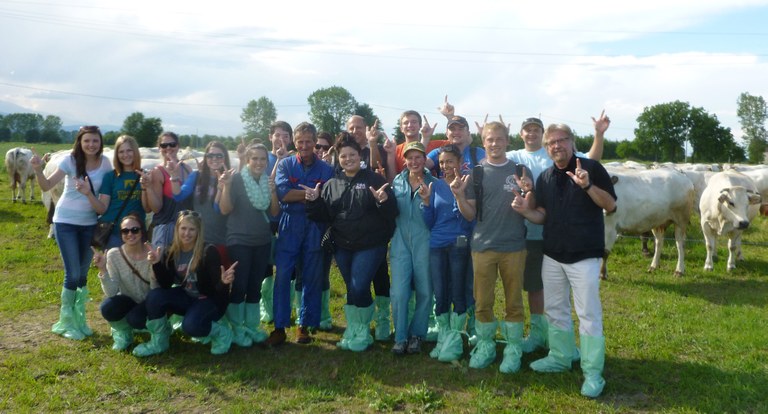The Italian Connection
Tuesday, August 22, 2017

Dr. Leon Spicer, professor of reproductive physiology in the Department of Animal Science at Oklahoma State University (OSU), has been collaborating with Dr. Francesca Caloni, an expert in veterinary toxicology from the Department of Veterinary Medicine at the University of Milan since 2004. This collaboration has led to six Italian visiting scholars coming to OSU to train in Dr. Spicer’s research laboratory over the past 13 years. The research projects Dr. Spicer and his Italian visiting scholars have worked on vary widely in scope but have a common focus; namely, evaluating the impact of environmental toxins on farm animal reproductive function.
Their research efforts have resulted in 13 peer-reviewed publications and 30 abstracts presented at numerous international scientific meetings. Research of Dr. Caloni and Dr. Spicer has unequivocally implicated several Fusarium mycotoxins in reproductive disorders of swine and cattle. On a global scale, cereal grains and animal feed may be contaminated with trichothecenes, such as deoxynivalenol and T-2 toxin, zearalenone, and fumonisins, the major mycotoxins of Fusarium fungi.
Dr. Spicer’s experiments in vitro indicate that trichothecenes and fumonisins directly affect ovarian granulosa and theca cell function and thus have the potential to cause reproductive disorders in farm animals. Some of their work not associated with Fusarium fungi was the first to show that the algal toxin, domoic acid, has direct effects on ovarian granulosa and theca cell steroidogenesis, therefore suggesting that domoic acid has the potential to be an endocrine disruptor.
Dr. Spicer and Dr. Caloni have applied for several international grants (as co-principal investigators) and hope that their work will be funded in the near future. In recent years, Dr. Spicer’s research laboratory has been funded by the National Institutes of Health, United States Department of Agriculture, and The Howard M. and Adene R. Harrington Chair in Animal Science. In total, Dr. Spicer has made 18 trips to Italy during the past 20 years. Some of the trips were for research collaboration but most were while leading his Italy study abroad class trips for students.
The main purpose of the study abroad trips is to expose students to sustainable agriculture methods used in Italy and to offer an opportunity to compare American and Italian agricultural systems. In addition, students were able to see the marvels of the Roman Empire, the artistic perfection of the Renaissance, enjoy exquisite Italian food, and learn more about the economic and political systems in modern Italy. During his trips to Italy, Dr. Spicer was able to establish three memoranda of understanding with OSU and the University of Milan, University of Padua, and the University of Bologna.
Clearly, Dr. Spicer’s Italian connection has been beneficial to OSU and its students. He hopes that with these exchange scholars visiting Stillwater and the study abroad opportunities for OSU students in Italy, a first step to better communication and future collaboration will be made with one of our world partners. For more information, contact Dr. Spicer at leon.spicer@okstate.edu.
